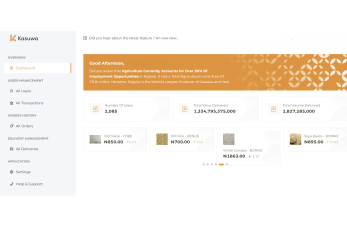Grit and Glory: How two women are transforming grain aggregation in Northeast Nigeria
In Mubi Local Government Area of Adamawa State, two remarkable women, Grace Audu and Naomi Tijjani Kwada, have become icons in the grain aggregation industry. Supported by the USAID-funded Feed the Future Nigeria Rural Resilience Activity (RRA) under the Grain Aggregation and Trade intervention, they have set new standards for grain aggregation in the Northeast region.
Grace Audu, a grain aggregator with over eight years of experience, has seen her business transform exponentially. Managing a household of eight, Grace struggled with grain storage, often resorting to chemicals to prevent insect infestations, which affected the quality of her grains and posed health risks to customers. However, through the intervention, she benefited from the distribution of Cocoons, a grain storage housing equipment given to partners and Grain Markets in the Northeast in December 2022 to eliminate the need for chemical usage in long-term grain storage facilities.
This improvement, combined with innovative tools such as digital weighing scales and enhanced knowledge of business promotion and growth, has significantly increased business efficiency for Grace.
The cocoons we received really made a difference,” Grace remembers. “There has been reduced loss of grains due to insects, and the grains are healthier now due to the absence of chemicals.
One of the most impactful changes for Grace has been the introduction of proper record-keeping. Previously, the lack of record-keeping made it difficult to track profits and plan for growth, leading to financial uncertainty and missed opportunities. As she explains,
In the past, I didn’t keep records or budget for expenses. Now, record-keeping helps me keep track of my business and plan, and this has helped me to expand my business.
With business linkages facilitated by the Activity, Grace has rapidly expanded her operations. She now invests up to 5 million Naira in grains, compared to the previous range of 500,000 to 1 million Naira, leveraging her knowledge and expanded networks.
Another trailblazer is Naomi Tijjani Kwada, a 46-year-old mother of seven with thirteen years of experience in the grain trade. Through the activity, Naomi gained essential knowledge of record-keeping, grain storage, and business networking, which she considers crucial to her success.
Record-keeping is very important to track business progress,” Naomi emphasizes. “It helped improve business efficiency, increase my income, and maintain customer relationships.
One of the most significant advancements for Naomi has been the integration of technology into her business operations. Before the intervention, Naomi typically purchased 70 to 80 bags of grain. Now, with enhanced business networks and the ability to utilize technology, she buys up to 400 to 500 bags. She explains that,
"In the past, I would travel to distant villages with a certain amount of money to purchase grains, only to realize an increase in cost or that the grains were not as good as expected. But with technology, I can see the quality of the grains using WhatsApp or on the Kasuwa platform and won't be caught unaware by price fluctuations. I can also pay using bank transfers, and even without going to the market, I know the market dynamics and can utilize my networks in different locations."
The grain trade in Mubi experienced a boost with the introduction of the Kasuwa digital market mobile application, which serves as an e-commerce platform for grain trade. The application was developed by Agriarche Limited with support from RRA. Trades on the app have grown to over 2.8 million tons of various grains valued at over 1.3 trillion naira from 2,085 active users.

Grace and Naomi are currently part of the decision-making committee of the grain markets in Adamawa State, where they are inspiring other women to join the grain trade value chain. Their journeys reflect the potential for growth and excellence in the grain aggregation sector for women despite being a male-dominated field. As these women continue to expand their businesses, they not only improve their livelihoods but also contribute to the economic development of their communities.
They have become beacons of success in the grain aggregation industry. Their dedication, coupled with the resources and knowledge they gained, demonstrates the transformative power of targeted interventions in promoting sustainable development and resilience in communities.
About the Feed the Future Nigeria Rural Resilience Activity
The Feed the Future Nigeria Rural Resilience Activity is a five-year, US$49 million program funded by the United States Agency for International Development (USAID) to facilitate economic recovery and growth in vulnerable, conflict-affected areas by promoting systemic change in market systems. The Activity is part of the U.S. Government's global hunger and food security initiative. It is aimed at empowering vulnerable households, communities and systems to cope with current shocks and stresses, and to be prepared to withstand future ones.
The Activity is implemented by Mercy Corps, in partnership with the International Fertilizer Development Center (IFDC) and Save the Children (SCI), primarily in the Northeast states of Adamawa, Borno, Gombe, and Yobe. Through the COVID-19 Mitigation Response Program, the Activity's operational areas also include Benue, Kebbi, Niger, and Ebonyi states, as well as the Federal Capital Territory. Using market-led approaches, the Activity will move over 800,000 individuals out of chronic vulnerability and poverty.